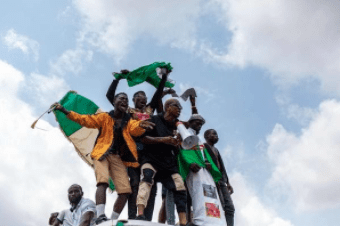 HUMAN RIGHTS ON CAPITOL HILL
HUMAN RIGHTS ON CAPITOL HILL
Table of Contents
Featured Issue
COVID-19 and Presidential Transition
International Updates
Human Rights Wins
In Case You Missed It
Human Rights Day
DECEMBER 2020 NEWSLETTER
FEATURED ISSUE
Human Rights Priorities in 2021
Human Rights Priorities for the Biden Administration
Human rights foreign policy priorities for the 117th Congress
Transformative Justice legislative priorities for 2021
COVID-19 and Presidential Transition
No Deployment of DHS law enforcement and Military Forces in Response to U.S. Election-Related Protests
International Updates
Africa
Nigeria
Indigenous rights in the Americas under attack
After mass rights violations by police, the Chilean people vote to formulate a new Constitution
Domestic Updates
Senate must reauthorize Violence Against Women Act Before Year’s End
28 Children at imminent risk of deportation
Border expulsions of unaccompanied children declared unlawful
Calls to free Pastor Steven
Human Rights Wins
In Case You Missed it
House Foreign Affairs Hearing on Human Rights
Special Webinar Commemorating Human Rights Day
What Should Lawmakers Do To Observe Human Rights Day?
Connect with us
Please don’t hesitate to reach out to any of our experts or email [email protected] for a general inquiry.
Regional Experts
Americas, U.S. Southern Border: Charanya Krishnaswami ![]()
![]()
![]()
![]()
![]()
![]()
![]()
![]()
![]()
![]()
![]()
![]()
![]()
![]()
![]()
Middle East/North Africa: Philippe Nassif ![]()
![]()
![]()
![]()
![]()
![]()
![]()
![]()
![]()
![]()
![]()
![]()
![]()
![]()
![]()
![]()
![]()
![]()
![]()
![]()
![]()
![]()
![]()
![]()
![]()
![]()
![]()
![]()
![]()
Thematic Experts
Surveillance, Technology, Digital Rights: Michael Kleinman ![]()
![]()
![]()
![]()
![]()
![]()
![]()
![]()
![]()
![]()
![]()
![]()
![]()
![]()
![]()
Refugees & Global Displacement / Gun Violence: Ryan Mace ![]()
![]()
![]()
![]()
![]()
![]()
![]()
![]()
![]()
![]()
![]()
![]()
![]()
![]()
![]()
![]()
![]()
![]()
![]()
![]()
![]()
![]()
![]()
![]()
![]()
![]()
![]()
![]()
![]()
Gender, Sexuality, and Identity / Indigenous Rights: Tarah Demant ![]()
![]()
![]()
![]()
![]()
![]()
![]()
![]()
![]()
![]()
![]()
![]()
![]()
![]()
![]()
![]()
![]()
![]()
![]()
![]()
![]()
![]()
![]()
![]()
![]()
![]()
![]()
![]()
![]()
National Security: Daphne Eviatar ![]()
![]()
![]()
![]()
![]()
![]()
![]()
![]()
![]()
![]()
![]()
![]()
![]()
![]()
![]()
![]()
![]()
![]()
![]()
![]()
![]()
![]()
![]()
![]()
![]()
![]()
![]()
![]()
![]()
Human Rights Defenders, Prisoners of Conscience & Individuals at Risk: Andrew Fandino ![]()
![]()
![]()
![]()
![]()
![]()
![]()
![]()
![]()
![]()
![]()
![]()
![]()
![]()
![]()
![]()
![]()
![]()
![]()
![]()
![]()
![]()
![]()
![]()
![]()
![]()
![]()
![]()
![]()
Turkey specialist: Deniz Yuksel ![]()
![]()
![]()
![]()
![]()
![]()
![]()
![]()
![]()
![]()
![]()
![]()
![]()
![]()
![]()
![]()
![]()
![]()
![]()
![]()
![]()
![]()
![]()
![]()
![]()
![]()
![]()
![]()
![]()
Be sure to follow AIUSA on TWITTER, FACEBOOK, and INSTAGRAM.



